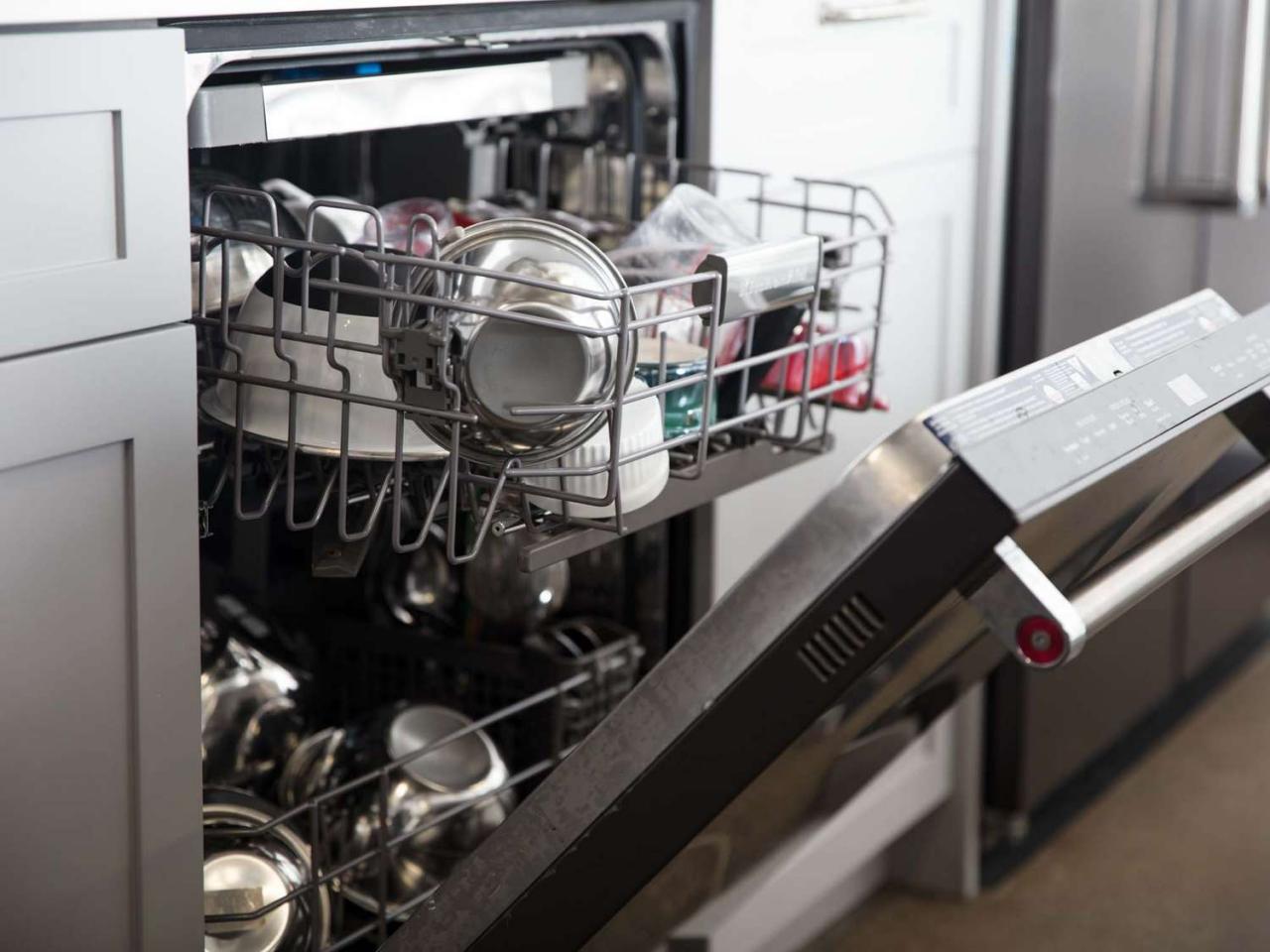The machines clean cutlery and cookware using high-speed hot water jets. Dishwashers are much easier to use than traditional hand-washing methods, which depend on an individual’s strength.
A mixture of detergent and water is sprayed from one or several jet sprayers to clean dishes in a dishwasher. Combination cycles are used to save water and wash a large number of dishes. In the first cycle, the water is used to wash the dishes. After the main wash cycle is complete, water automatically drains and new water pushes into the machine to rinse dishes. The cycle repeats until the dishwashing machine dries the dishes inside.
Dishwasher Don’ts
While using the dishwasher to clean utensils, there are some basic guidelines that you should follow:
- Operate On a Proper Load
When using a dishwasher, it is essential to not overload the machine. It is also important to refrain from using the dishwasher for multiple, frequent half-loads. Water and electricity will be wasted if you run the dishwasher frequently. It is important to load the dishwasher to maximum capacity to get its full benefits. Read the instructions and make sure you load your dishwasher according to them.
- Rinsing agent
When a dish is left in the sink, it can become sticky. Tea and coffee leave stains in cups when they are acidic. In order to get the best result when cleaning these dishes in the dishwasher, you will need a rinse agent. The hot water spray can not remove the dry food or stains. To get the best results, it is important to also read and follow the manual. It is important to read the user manual for good usage.
- Use very hot water
Dishwashers use hot water sprays to wash the dishes. Hot water is more effective at cleaning dishes than cold, kills bacteria and disinfects. In hot water, the detergent will also dissolve properly. Ideal temperature ranges from 50-75 degrees centigrade.
- Regular Inspection
Regularly inspecting the state of your dishwasher is essential. Idealy, you should inspect it at the end each day. The small bits of grease and detergent residue can accumulate and become stuck. To avoid a bad smell, the dishwasher filter should be washed and cleaned periodically. A regular inspection can also help prevent dishwasher repairs.
- Maintenance
Wear and tear is a part of all mechanical products. The user’s behavior can also affect wear and tear. Regular preventive maintenance is important to reduce the likelihood of a repair at a future date.
- Sorting Dishes
Sort and separate the dishes before loading them in the dishwasher. It will help to clean the dishes effectively, and ensure that the dishwasher is used optimally.
- Spread out the Dishes
Leaving space between dishes is another way to get the best results from your dishwasher. This space allows the hot water jet to reach every dish, and effectively clean it. The clutter will prevent the hot water jet spray from reaching the small crevices of each dish and removing dry, sticky food particles.

Don’ts for Dishwashers
- Do Not Pre-Wash Dishes
Dishwashers are made to clean all food particles, including large ones. They also remove grease. The general trend is to remove large chunks or food particles from dishes prior to washing in the dishwasher. The water that is used to wash the dishes will be wasted if you semi-rinse them. Besides, the power of the jet can damage the dishes.
- Never overload the dishwasher
The human tendency is to stack the dishes together and wash them at once. Overloading the dishwasher will prevent the dishes from being washed effectively. A second wash cycle will waste water and cause a delay if some dishes need to be washed. To get the best result, it is essential to only use the entire load according to the manual of your dishwasher.
- Do Not Use Excessive Detergent
To get desired results from the dishwasher, it is important to use the detergent. If you use too much detergent, the residual soap will remain in your dishwasher. The buildup of residue can lead to problems in the dishwasher over time.
- Dishwasher Items You Should Not Wash
It is best to avoid washing non-stick pans and knives in the dishwasher. Over time, the hot jet spray will dull the knives and damage or destroy the non-stick surface of the pans. Avoid washing cast iron dishes, wooden dishes and dishes with hand-painted designs in your dishwasher.
- Avoid Overloading Silverware
The silverware drawer in your dishwasher should not be overloaded. Silverware that is cluttered will prevent water from cleaning each piece effectively. To avoid injury, keep sharp objects like forks facing up.
- Use of the cycle incorrectly
The dishwasher cycle for dishes used in heavy cooking is longer than that of other dishes. Separating dishes will help you avoid repeated or incorrect washing cycles.
Last words
When you are wondering how to properly use a dishwashing machine, deciding how much detergent to add is an essential step. Dishwashers can be set to clean with or without soap. Detergents are available in liquid, tablet, and powder form to meet your needs. Select a dishwashing detergent that effectively cleans your dishes without leaving behind a lot of suds. You can avoid the dishwasher becoming clogged with excessive foam by using this method.

